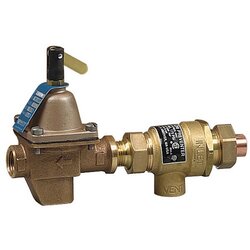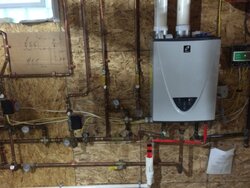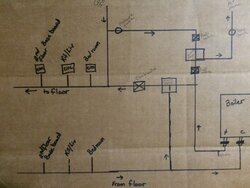Hello all,
I wanted to get everyone's opinion in regards to the heating system currently in our home. Little bit of background, we built our home approximately three years ago and are currently running a hearthstone equinox to heat our 1900 square-foot log cabin. Although I like the stove and its performance I would prefer the fire smoke and mess outside of the home. Within our home we have an open heating system where we draw water ( powered by an LP boiler) from our radiators and in floor radiant heat for domestic water. Being that we have baseboard on the second floor and in floor radiant on the entire first it is obviously mixed down to lower temperatures as our propane boiler is set at 175.
I have done quite a bit of research in regards to the outdoor wood gasification boilers. I really have my eye on the portage and Main unit but have also been eyeing a more local dealer who sells the G 200.
My plan was to simply install an outdoor boiler and utilize the heat through a heat exchanger plate. Here is my concern, looking at all of the boilers you typically run and chemical additive to help prevent corrosion within the system. This will obviously be separated by a exchange a plate to keep The chemically treated water within the boiler from entering the home. My concern is because we have an open system and the floors also serve to provide water for the domestic hot water in which we drink what risk is there if the heat exchanger plates failed? I was speaking to a local gentleman who heard of a farmer who utilized a boiler to provide water to his cattle and barn. Apparently several died when the heat exchanger plate failed and bypassed boiler treatment fluid into the barn.
Just curious what everyone's thoughts were on this? I spent quite a bit of time on the site and have never come across anything of the sort.
Thanks!
I wanted to get everyone's opinion in regards to the heating system currently in our home. Little bit of background, we built our home approximately three years ago and are currently running a hearthstone equinox to heat our 1900 square-foot log cabin. Although I like the stove and its performance I would prefer the fire smoke and mess outside of the home. Within our home we have an open heating system where we draw water ( powered by an LP boiler) from our radiators and in floor radiant heat for domestic water. Being that we have baseboard on the second floor and in floor radiant on the entire first it is obviously mixed down to lower temperatures as our propane boiler is set at 175.
I have done quite a bit of research in regards to the outdoor wood gasification boilers. I really have my eye on the portage and Main unit but have also been eyeing a more local dealer who sells the G 200.
My plan was to simply install an outdoor boiler and utilize the heat through a heat exchanger plate. Here is my concern, looking at all of the boilers you typically run and chemical additive to help prevent corrosion within the system. This will obviously be separated by a exchange a plate to keep The chemically treated water within the boiler from entering the home. My concern is because we have an open system and the floors also serve to provide water for the domestic hot water in which we drink what risk is there if the heat exchanger plates failed? I was speaking to a local gentleman who heard of a farmer who utilized a boiler to provide water to his cattle and barn. Apparently several died when the heat exchanger plate failed and bypassed boiler treatment fluid into the barn.
Just curious what everyone's thoughts were on this? I spent quite a bit of time on the site and have never come across anything of the sort.
Thanks!




